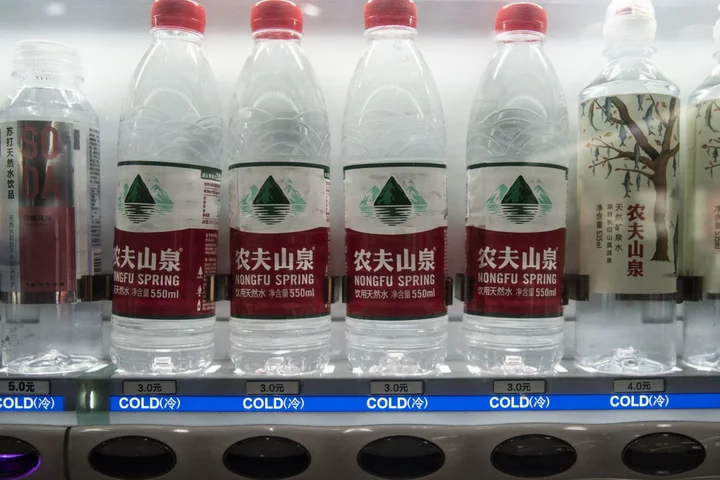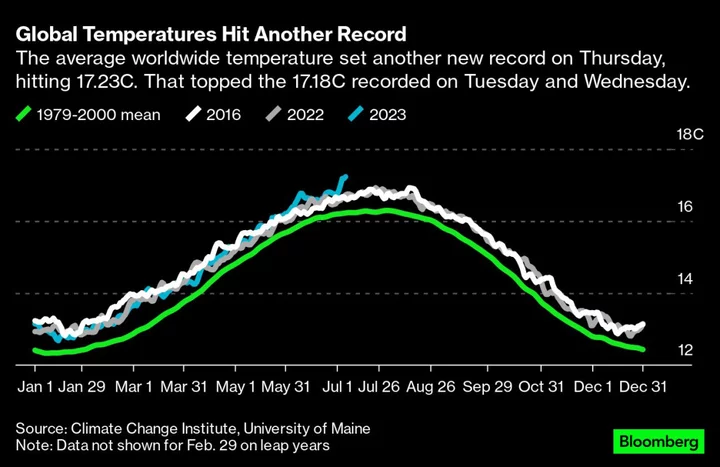SK Hynix Inc. reported better-than-expected revenue, declaring the memory chip market is recovering because of surging interest in artificial intelligence.
The supplier of memory chips to Apple Inc. reported sales of 7.31 trillion won ($5.7 billion) in the June quarter, down 47% from a year ago but beating an average projection for 6.05 trillion won. Its operating loss came to 2.88 trillion won, versus an expected 2.86 trillion won loss.
“Amid an expansion in generative artificial intelligence (AI) market, which has largely been centered on ChatGPT, demand for AI server memory has increased rapidly,” the company said in a statement Wednesday.
Samsung Electronics Co., Hynix and Micron Technology Inc. have struggled for the better part of two years with a post-Covid collapse in demand for the memory chips essential to smartphones, servers and computers. This month, larger rival Samsung recorded its worst decline in quarterly sales in more than a decade, while sector bellwether Taiwan Semiconductor Manufacturing Co. cut its outlook and postponed production at its Arizona project to 2025, underscoring the depth of a global electronics market slump that set in after consumers and corporations trimmed spending to deal with a downturn.
Hynix recouped some of its losses since 2021 this year, gaining about 51% on bets that output cuts and greater economic certainty might lift industry prices. Analysts including JP Morgan also cited the rollout of new high-bandwidth memory that works in tandem with AI hardware such as Nvidia Corp. graphics accelerators and datacenters, which promise to speed up data processing for intensive tasks such as training AI.
Executives told analysts in April they expected sales to rebound in the June quarter and memory market conditions to improve from the second half. Those comments buoyed optimism about an end to an unprecedented slump that’s gripped the $160 billion global memory industry, which has been sitting on months’ worth of inventory. This year, Samsung and its peers cut output to try and stabilize memory prices.
Read more: Samsung Sales Fall Most in Over a Decade as Chip Slump Persists
But it remains unclear when the industry — infamous for its boom and bust cycles — will climb out of its sales trough. Much may depend on a fundamental Chinese economic rebound, which remains uneven. A global boom in AI could also drive demand for datacenters and servers, which rely on high-density memory chips for storage.
What Bloomberg Intelligence Says
SK Hynix’s weak 2Q might also be anticipated due to results of peers Micron and Samsung. 2Q DRAM-bit shipments may have risen sequentially, which could be offset by average selling price (ASP) erosion. NAND bit shipments could have also increased sequentially, as customers need to prepare for a seasonal production increase toward 3Q. NAND’s ASP could have also dropped, as Micron’s mid-10% ASP drop suggests.
SK Hynix could expect bit-shipments of memory chips to rise sequentially in 3Q, with gradual improvement in pricing environment.
- Masahiro Wakasugi, BI analyst
Click here for the full research
Longer term, it’s unclear how a US-China conflict over technology and semiconductors might affect the industry. Beijing launched a security review of chips from Micron this year, spurring concerns the government there is taking a more aggressive stance toward foreign companies. The country is among Korea’s largest export destinations, and both a key market as well as a production base for companies from Samsung to Hynix.
Hynix and Samsung currently operate in China under a one-year waiver or license on equipment imports.
How US and Allies Are Trying to Rein In China Tech: QuickTake









